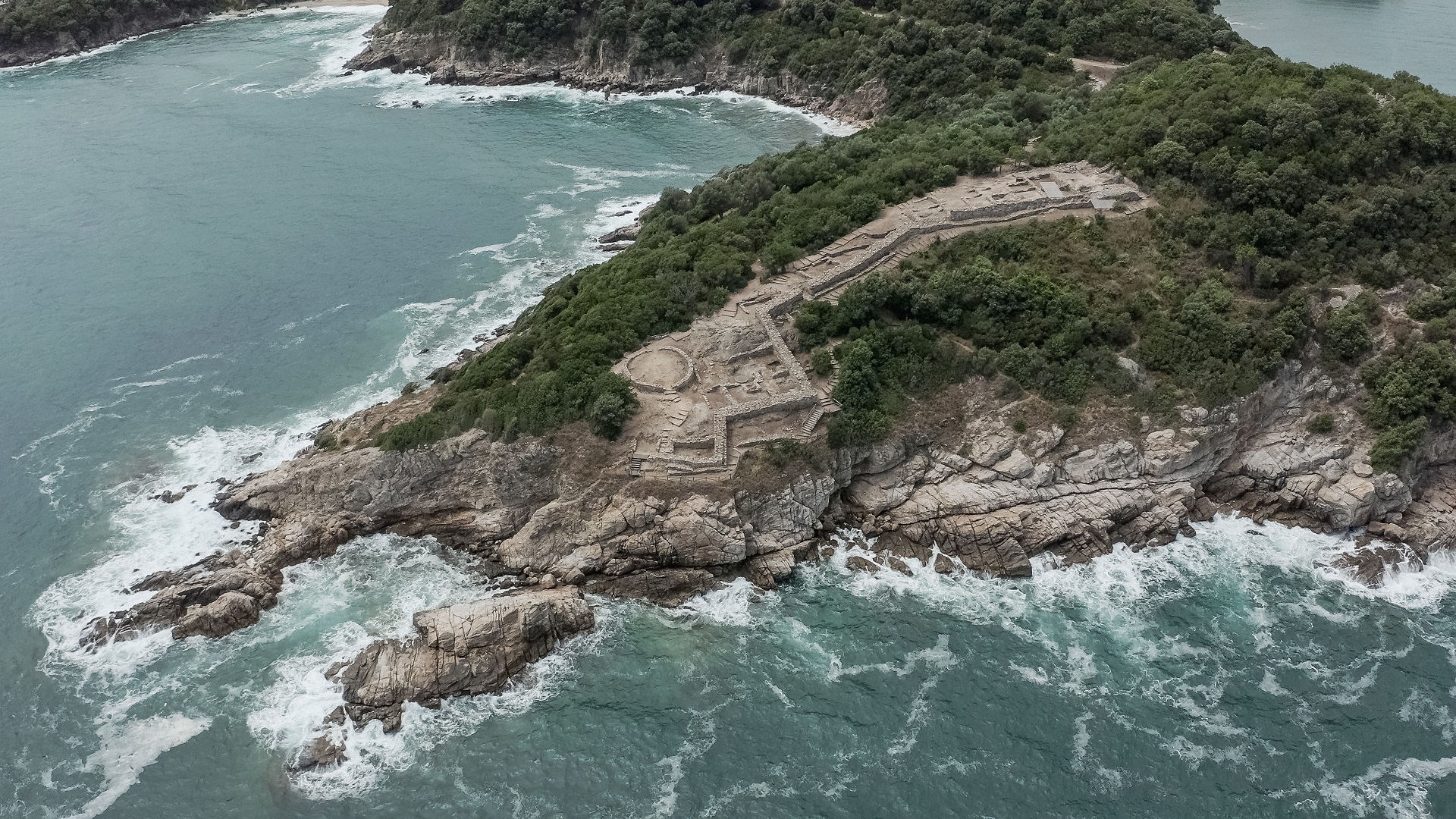
The ancient city of Stagira is located northeast of Olympiada and is best known as the birthplace of the philosopher Aristotle. It extends over a small mountainous peninsula, currently named Liotopi. The ancient city was founded by Ionian colonists from Andros in the middle of the 7th century BC. It was destroyed by Philip II, king of Macedonia in 349, but it was reestablished by him in honor of Aristotle, tutor of Alexander, son of Phillip. Excavations revealed a large part of the city that shed light on the everyday life of the city, its walls, sanctuaries of the archaic period and the agora.
The ruins of the ancient city extend over two hills overlooking the sea, on the verdant Liotopi peninsula, northeast of the present-day village of Olympiada.
The ancient city of Stagira was founded in 655 BC by Ionian colonists from Andros, who arrived there in search of new trade routes and metal-bearing deposits. It was an independent city with its own currency, and a boar (kapros) as an emblem. In fact, the name Kapros was given to the port of the city, as well as the islet just opposite the peninsula. The great philosopher Aristotle was born in Stagira in 384 BC.
After the end of the Persian Wars and the departure of the Persians, Stagira joined the Early Delian League, from which they defected in 424 BC, during the Peloponnesian War. Shortly thereafter, with the Peace of Nicias, they regained their autonomy, with the obligation to pay a fixed amount of tribute.
In 349 BC, the city was closely besieged and succumbed to Phillip II, who destroyed it, despite the valiant resistance of its inhabitants. A few years later, he reestablished it after the intervention of Aristotle, who had, in the meantime, become tutor to the young Alexander.
Archaeological research brought to light public buildings, sanctuaries, houses, city walls and the acropolis during the decade 1990-2000. On the northern hill, the wall from the time of Philip II (356-336 BC) is preserved, and on the southern hill, the wall, which is preserved in very good condition, dates back to the 5th century BC. The acropolis with the triangular enclosure stands at the top.
Archaic and Classical houses from the Archaic and Classical periods (6th-4th century BC), water tanks, the city’s aqueduct, winepresses and storage areas provide a vivid image of the city. The Thesmophorion, a sanctuary in honor of Demeter and a temple dedicated to Zeus Soter and Athena Soteira, all of the 6th century BC, were also investigated. Between the two hills, the agora of the city (6th-5th century BC) was revealed, with its classical portico, shops, storerooms and cobbled streets.
An impressive arched public building was excavated above the agora named “Aristoteleion” which is believed to be the tomb-altar of Aristotle, where the ashes of the Stagirite philosopher were placed after being transported from Chalcis, where he died in 322 BC.
Remains of a wall and edifices of the 4th century BC were also found just opposite the city, on the islet called Kafkanas.
In recent years, promotion works have made Stagira an attractive archaeological site, nestled in a landscape of outstanding natural beauty.
References
Κ. Σισμανίδης, Αρχαία Στάγειρα. Η πατρίδα του Αριστοτέλη, Αθήνα 2003.
Κ. Σισμανίδης, Στάγειρα, στο Α. Βλαχόπουλος – Δ. Τσιαφάκη (επιμ.), Αρχαιολογία. Μακεδονία και Θράκη (εκδόσεις Μέλισσα) Αθήνα 2017, 383-387.
Κ. Σισμανίδης, Στάγειρα, στο: Ε. Στεφανή – Ε. Τσαγκαράκη – Α. Αρβανιτάκη (επιμ.), Από τον Νότο στον Βορρά. Αποικίες των Κυκλάδων στο βόρειο Αιγαίο, Κατάλογος έκθεσης Αρχαιολογικό Μουσείο Θεσσαλονίκης 12.07.2019-31.08.2020 (Θεσσαλονίκη 2019), 89-96
Χειμερινό:
08:30-15:30 1η Νοεμβρίου έως 31 Μαρτίου
Θερινό:
08:30-15:30 1η Απριλίου έως 31 Οκτωβρίου
Κλειστά Τρίτη
Με αυτοκίνητο ή με ΚΤΕΛ του
νομού Χαλκιδικής μέχρι την
κοινότητα Ολυμπιάδας.
προβολή σε χάρτη
Είσοδος ελεύθερη
Address: Konstantinoupoleos 5,
631 00 Polygyros Halkidiki
Phone: +30 23710 22060
Fax: +30 2310 251892
Mount Athos Technical Office
Address: 7 Hippodrome Square, Thessaloniki
Phone: +30 2310 285163
Fax: +30 2310 251892
E-mail: [email protected]
